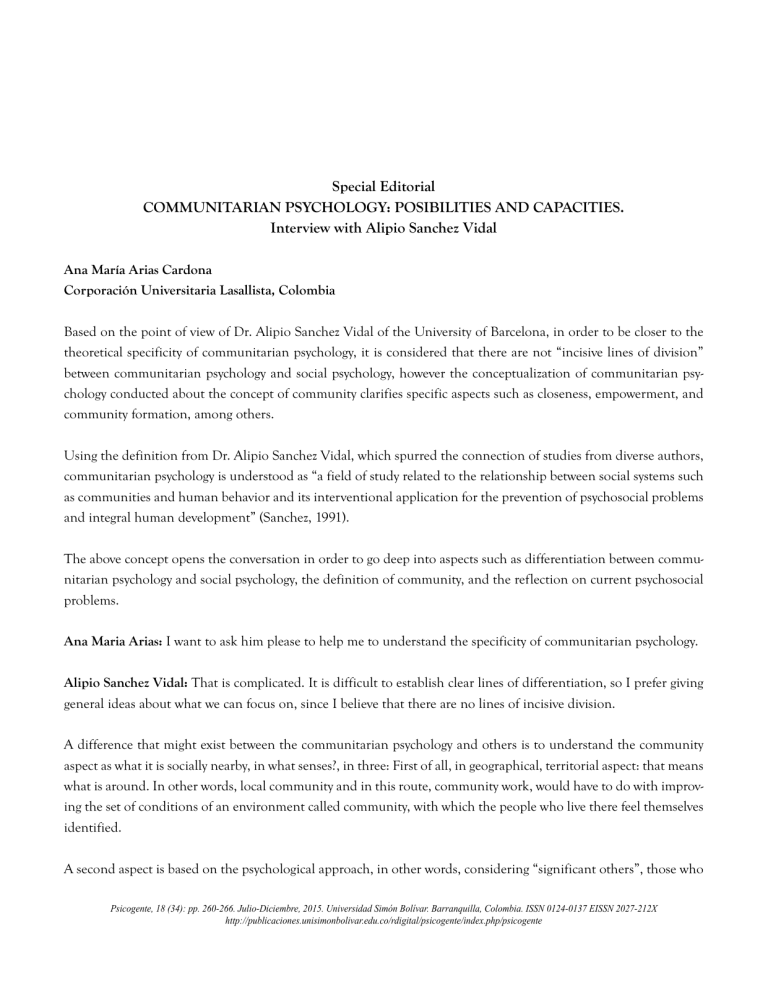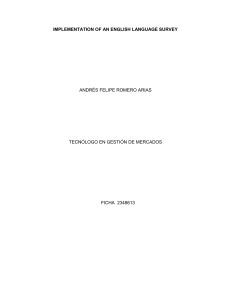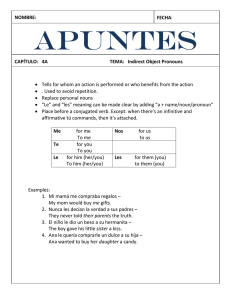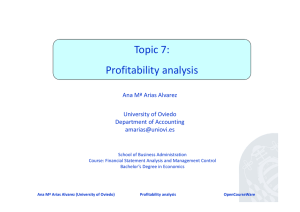CAPACIDADES COMUNITARIAS
Anuncio

Special Editorial COMMUNITARIAN PSYCHOLOGY: POSIBILITIES AND CAPACITIES. Interview with Alipio Sanchez Vidal Ana María Arias Cardona Corporación Universitaria Lasallista, Colombia Based on the point of view of Dr. Alipio Sanchez Vidal of the University of Barcelona, in order to be closer to the theoretical specificity of communitarian psychology, it is considered that there are not “incisive lines of division” between communitarian psychology and social psychology, however the conceptualization of communitarian psychology conducted about the concept of community clarifies specific aspects such as closeness, empowerment, and community formation, among others. Using the definition from Dr. Alipio Sanchez Vidal, which spurred the connection of studies from diverse authors, communitarian psychology is understood as “a field of study related to the relationship between social systems such as communities and human behavior and its interventional application for the prevention of psychosocial problems and integral human development” (Sanchez, 1991). The above concept opens the conversation in order to go deep into aspects such as differentiation between communitarian psychology and social psychology, the definition of community, and the reflection on current psychosocial problems. Ana Maria Arias: I want to ask him please to help me to understand the specificity of communitarian psychology. Alipio Sanchez Vidal: That is complicated. It is difficult to establish clear lines of differentiation, so I prefer giving general ideas about what we can focus on, since I believe that there are no lines of incisive division. A difference that might exist between the communitarian psychology and others is to understand the community aspect as what it is socially nearby, in what senses?, in three: First of all, in geographical, territorial aspect: that means what is around. In other words, local community and in this route, community work, would have to do with improving the set of conditions of an environment called community, with which the people who live there feel themselves identified. A second aspect is based on the psychological approach, in other words, considering “significant others”, those who Psicogente, 18 (34): pp. 260-266. Julio-Diciembre, 2015. Universidad Simón Bolívar. Barranquilla, Colombia. ISSN 0124-0137 EISSN 2027-212X http://publicaciones.unisimonbolivar.edu.co/rdigital/psicogente/index.php/psicogente 261 have great importance for us such as: family, neighbors, partners of play or work. With those that we care about, because there is a psychological tie and therefore it is possible to work jointly or work with some to affect others, for example to work with parents to improve children’s conditions. A third aspect is social approach: those which have interests or common problems through associations of groups that share not only problematic or social worries, but also resources. For example, people who want to improve education or to lift children from the street or violence are the people who share several things because of their social closeness with which you can work. In this way, the meaning of community does not focus on a set of systems but on that social closeness which is consolidated as a communitarian organizing axis. This organizing axis is understood basically in two ways: from interaction and from social influence. In this sense, communitarian psychology is like a type of social practical psychology, which is focused on the social aspect, to produce changes and not only study what happens. Communitarian psychology is related to empowerment (Montero, 2006), not as a purpose but as a way to improve targets and community goals. There are also other mediating factors, like rules, values, affections, and learning. These factors are shared between community socialization and work areas, which would be focused on working these processes in order to help human development as members of a major social group, linked, not disconnected. But if we want to be realistic, communitarian psychology must admit that this human development will only take place if the subjects become real agents (something that depends on them, on the social context, and on the activating capacity on community work), which would propose a significant social change. Ana Maria Arias: In this process of thinking about territorial, psychological, and social closeness, it sometimes associated with communitarian psychology only in relation to work in multidimensional poverty environments or with people who have been in contexts of vulnerability or situations of marginality: what do you think about that? Alipio Sanchez Vidal: I do not see any problem working with poor people, the point herein lies in the identification and research for intervention, since typically our altruism and our sense of charity indicate that we have to help the poor, all those who are unwell and certainly must be part of the problem. The point is to assume structural roots of the human and social problems with which we work (Sanchez, 2007); the problem, the recipient of the action, is not only the poor but, also, the poverty in their own life. It is necessary to consider how poverty might be eliminated. Psicogente, 18 (34): pp. 260-266. Julio-Diciembre, 2015. Universidad Simón Bolívar. Barranquilla, Colombia. ISSN 0124-0137 EISSN 2027-212X http://publicaciones.unisimonbolivar.edu.co/rdigital/psicogente/index.php/psicogente 262 Ana Maria Arias: We should consider: what happened? How did we generate exclusion relations with an inequitable distribution? Alipio Sanchez Vidal: Certainly, and to analyze the relation between poverty and wealth, since we have models of functioning and political-social philosophies and global economies. But not only might we consider poverty as an economic scarcity but, also as a psychological and social condition tied to perceptions and feelings of powerlessness and learned defenselessness, which lead to passivity and dependency, not to the self perception of being a subjectagent and being powerful. Conclusion? Communitarian work is not tied only to social closeness but, also to alienation, poverty, and inequality and, as also belonging to wealth and equity. Therefore the groups of topics to work on have to be collective and global (to include, for example, the poor and the rich and their possible causes) and power is a key element. Ana Maria Arias: And to promote the communitarian work, empowerment, and agency capacity in different stages, not just poverty, necessarily. Alipio Sanchez Vidal: Yes, you are right, it is necessary to focus on two things: first, empowerment is a means to an end. It is necessary to check the goals and who establishes them (Sanchez, 2013). Secondly, differential empowerment is very important, based on the social justice point of view of Laue and Cormick, confirming that empowerment should favor proportionally; in other words, giving more to those who have less. If an empowerment cooperative model is assumed, based on mutuality and community creation, with an altruistic approach, the power is an unlimited resource and it is possible to share. But if those who have power are not able to share it, although social solidarity is maintained, that model does not work; it is necessary to use another competitive or conflict model. Considering the redistributive conflict model, power is a limited resource that is not possible to share, so that means for some people to have more power they need others have less, which is conducive to competition or struggle for a scare good: power. The way to get empowerment is by conflict, and the communitarian exchange broker tries to be impartial, working with two parts, or, if that is morally harmful for the weakest or strategically unviable, to help to those who have less power. Ana Maria Arias: Of course! Alipio Sanchez Vidal: I believe we have to be very conscious about the moral aspect, since the psychologist can create Psicogente, 18 (34): pp. 260-266. Julio-Diciembre, 2015. Universidad Simón Bolívar. Barranquilla, Colombia. ISSN 0124-0137 EISSN 2027-212X http://publicaciones.unisimonbolivar.edu.co/rdigital/psicogente/index.php/psicogente 263 some expectations on some uncertain results in complex topics and processes, like the dynamics of power, in which, instead of helping empowerment, we contribute to frustration and disempowerment … Ana Maria Arias: And to distrust, also in institutions we represent. Alipio Sanchez Vidal: Exactly, often and depending on the situation it can be good to work with different actors, professionals, non-professionals, politicians, those above and below, being careful not to do the work they have to do, but, rather facilitate … Ana Maria Arias: Be more facilitators, dynamic agents... Alipio Sanchez Vidal: Yes, of course, we must intervene, we are just like mere spectators, but avoiding putting our goals or intentions in place of theirs, we do not empower, they empower themselves, we simply can help them. Ana Maria Arias: If we are not careful, it becomes a hegemonic discourse for the sake of empowerment, another abuse of authority to believe that one is right and to silence other voices. Alipio Sanchez Vidal: Undoubtedly. Ana Maria Arias: In regards to these ethical dilemmas that imply community accompanying processes, I would like to speak about contexts such as that of Latin America and specifically that of Colombia particularly, where the whole topic of armed conflict fractures the relations of confidence, naturalizes forms of violence, legitimizes semi-official modes of power and of course, fragments the whole affective matter: what would be the challenges to think of it from the communitarian psychology perspective? What is the sense of community and of “we”, when we are in the middle of discourses of such structural violence, like in my country? Alipio Sanchez Vidal: Certainly, I know the problems a little bit, there are problems of confidence, community and feelings, rather feelings that instead of joining, separate, in fact there is hate and a shared experience that separates. The task will be the recognition of the other, the topic of truth establishment, shared history, because there the topic of shared memory, the construction of everything that has happened, is linked, and this connects with underlying feelings. Ana Maria Arias: And in the singularity of every person. Alipio Sanchez Vidal: There is the topic of sharing, and in relation to diversity perhaps it is necessary to work on it too. I believe that it is a topic of experience, trying with a lot of information, with a lot of knowledge of the reality Psicogente, 18 (34): pp. 260-266. Julio-Diciembre, 2015. Universidad Simón Bolívar. Barranquilla, Colombia. ISSN 0124-0137 EISSN 2027-212X http://publicaciones.unisimonbolivar.edu.co/rdigital/psicogente/index.php/psicogente 264 that lives with communitarian work that can be done; it is not to give recipes, but rather proving what works in each site. It might be useful to work the memory with every community, and then to review if they can meet and work it collectively, not to join victims and killers at the beginning, because instead of improving it, this is going to worsen it and if each one needs their own historical memory, they have the right to construct it. The mutual recognition as subjects seems to be very important in my opinion, because if not, they are hardly going to have a fruitful dialogue. Also, the past cannot be avoided, but it is necessary to transcend it and to construct something for the future: what do I want for the future? What do we have in common? Or, what do we want to have in common? Ana Maria Arias: I believe that there are also other challenges, since in relation to the current supremacy of individuality, the easiest way, of “save yourself if you can”, how do we promote communitarian work? What do we do to think on a theoretical level? Alipio Sanchez Vidal: Well, questioning if sharing ethics are viable, about “we,” about collectivity, two aspects take precedence that clearly can be identified: First, individualism, which is a very worrying phenomenon because from this vision it produces, it consumes, and problems are defined as an individual, “it is my problem, it is not yours”. Second, ethical egoism is difficult to share, “my problems are mine and therefore you solve your problems”. The theme is that we are moving inside a society that has moral, social and political parameters, and normally an institutional frame, which makes work difficult, and in this sense, we are doing a countercultural task. Since the values of communitarian psychology, which are sharing, mutuality, shared power, and altruism, are exactly opposite of the values of capitalism, such as individualism, interest, utility, etc., then, how can it be done? Ana Maria Arias: We are swimming against the current. Alipio Sanchez Vidal: Exactly, first of all we have to make ourselves understood, second we have to review the issues from a moral and epistemological point of view, since we are a part of a whole that we can influence, but the decision on the type of society we live in does not just fall on us, perhaps we can be an influential actor, have a few ideas and a few experiences that influence others, but we are not anybody to decide for society as a whole. Then, how can we contribute? We have to admit that our values are counterculture and we must do a great work to convince people that we live in a bureaucratized, very dehumanized world, that has broken community ties, which causes a series of social pathologies and therefore it would be necessary to propel changes that will bring a more inclusive and human society and human, even if it implies renouncing part of our well-being. Psicogente, 18 (34): pp. 260-266. Julio-Diciembre, 2015. Universidad Simón Bolívar. Barranquilla, Colombia. ISSN 0124-0137 EISSN 2027-212X http://publicaciones.unisimonbolivar.edu.co/rdigital/psicogente/index.php/psicogente 265 Ana Maria Arias: The risk also would be to fall in the nostalgia of thinking that “all past time was better” and that it would be necessary to restore certain communitarian ideals, right? Alipio Sanchez Vidal: Yes, let’s start considering that there are many people with a series of clichés that are related with the left: “we are the good ones the rest of the people are the bad guys”, a preconceived idea that is not necessarily true. That is why it is necessary to be very conscious that what we defend in every country is sometimes opposite to certain socially dominant values that tend to produce fragmentation and individualism. Then, it is very important that we propose alternatives, that we have to defend and promote values in the sense of community, of sharing and social justice. Proposing spaces, subjectivities of groups, of experiences, of collectives, like help groups, of construction of collectiveness and seeing how much it works. These spaces are proposed so that people choose, which is why they must be sure that it is necessary to change the way of living and be a society where you can be related cooperatively to others and can develop as person. Ann Maria Arias: How might we think about those basic principles of communitarian psychology to understand some phenomena of alternative communities today: social movements and processes of collective action, For example, so-called cybercommunities or environmentalist communities? Alipio Sanchez Vidal: Very interesting question, since when we work on, for example, the TIC (Technologies of Information and Communication), we understand the community in two visions, at once a physical community, the people who are together (even through screens) and another vision: the psychosocial one, that are the ties and the relations that you support with other people and psychological interaction. It is understood that what generates community is what is shared, the interaction and common experiences, for this reason people who are literally very far and who cannot meet are not constituted as community, but rather as a relation of contact that can be a beginning for something more and is characterized because there are shared interests, although they have problems realizing transformations in the territory. This is what Tonnies would call an “affiliation” although feelings and emotions are also exchanged, but how can we lead something more? How can it be maintained? That is why, the political component is necessary to produce effects, since the postmodern topic of diversity, which has resulted in people who, because of cultural reasons, were out of the margins, for sexual, religious, political reasons, of any type, are recognized. Now then, that should be incorporated into a community, that their rights are recognized is very difficult because of the typical defense, what some theorists have named “solidarity of the healthy”. Psicogente, 18 (34): pp. 260-266. Julio-Diciembre, 2015. Universidad Simón Bolívar. Barranquilla, Colombia. ISSN 0124-0137 EISSN 2027-212X http://publicaciones.unisimonbolivar.edu.co/rdigital/psicogente/index.php/psicogente 266 Ana María Arias: Which means recognizing that we are “the other other”. Alipio Sanchez Vidal: Some of them recognize it, but the situation is reaching a limit: In psychology, it is extremely complicated because of the wide variety Unfortunately for community psychology, an idea of a homogenizing community still exists, that is not valid for the era we live in, which is effectively of societies characterized by cultural diversity and fusion of cultures, so another type of community is needed and what some say “inclusive communities”, which accept differences, which recognize them and give them a place, that is what we can achieve from postmodernism. Ana Maria Arias: Certainly, and the topic of ethics and politics that are several coexistent communities, and that it is very probable that the community projects do not go in the same route, the idea is that another community is also legitimate although it is different from mine. Alipio Sanchez Vidal: Yes, that at least certain dimensions are going to retain their differences so that there can be certain community, sharing in others, mutuality, I believe that is the lesson. In conclusion Inside the possibilities and the opaquenesses of communitarian psychology today is the challenge of reading that component of territorial, psychological and social “closeness” in other key possible ways of promoting mutuality, empowerment, the “we” in a kaleidoscope of “communities” that cross screens, survive wars and materialize multiple ways of being present with others and thinking about the “common good”. REFERENCIAS Montero, M. (2006). El fortalecimiento en la comunidad. En M. Montero, Teoría y práctica de la psicología comunitaria (pp. 59-92). Buenos Aires: Paidós. Sánchez, A. (1991). Psicología comunitaria: Origen, concepto y características. Papeles del Psicólogo, (50), 1-6. Sánchez, A. (2007). Manual de psicología comunitaria: Un enfoque integrado. Madrid: Pirámide. Sánchez, A. (2013). ¿Es posible el empoderamiento en tiempos de crisis? Repensando el desarrollo humano en el nuevo siglo. Universitas psychologica, 12(1), 285-300. Ana María Arias Cardona Corporación Universitaria Lasallista, Colombia Psicogente, 18 (34): pp. 260-266. Julio-Diciembre, 2015. Universidad Simón Bolívar. Barranquilla, Colombia. ISSN 0124-0137 EISSN 2027-212X http://publicaciones.unisimonbolivar.edu.co/rdigital/psicogente/index.php/psicogente








